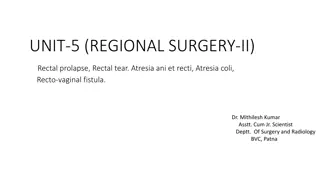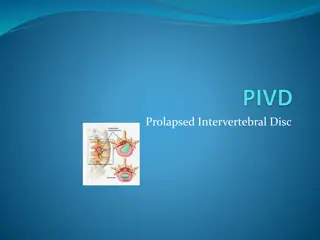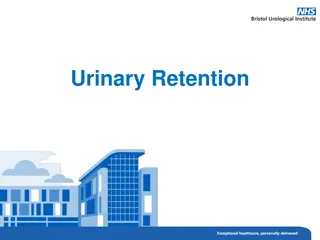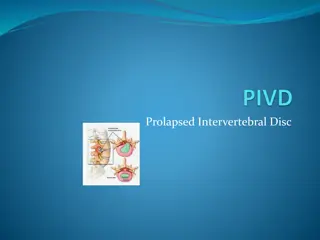Rectal Prolapse and Rectal Tears in Animals: Causes and Treatments
Rectal prolapse and rectal tears are common conditions observed in cattle, buffaloes, and small ruminants. Prolonged tenesmus, increased intraabdominal pressure, rectal inflammation, and other factors contribute to the development of these issues. Early diagnosis and treatment are crucial to prevent
2 views • 34 slides
Understanding Prolapsed Intervertebral Disc (PIVD)
The intervertebral disc, a crucial component of the spine, can be affected by prolapse, leading to various stages of PIVD. The condition involves the nucleus pulposus bulging out due to tears in the annulus fibrosis. The stages of PIVD include bulging disc, protrusion, extrusion, and sequestrization
0 views • 36 slides
Understanding Urinary Retention: Causes, Symptoms, and Management
Urinary retention can be acute or chronic, resulting in the painful inability to void or fully empty the bladder. In men, common causes include benign prostatic enlargement and post-surgery complications, while women may experience it due to pelvic prolapse or neurological issues. Initial management
3 views • 13 slides
Understanding Prolapsed Intervertebral Disc (PIVD) and its Stages
The article explores the anatomy of intervertebral discs, definition of spinal disc prolapse, stages of PIVD (bulging disc, protrusion, extrusion, sequestration), and provides detailed insights into each stage with corresponding images. Readers can gain a comprehensive understanding of PIVD and its
0 views • 36 slides
Dr. Julie Oliver - Transforming Women's Health Care: A Community Approach
Dr. Julie Oliver, a GP at Lanchester Medical Centre, initiated a community women's health clinic in 2002 with a focus on complex gynaecology services. The clinic offers specialized care such as managing heavy periods, menopause, prolapse, and more, following a one-stop shop model for efficient patie
0 views • 18 slides
Understanding Torticollis, Prolapse, and Infection in Infants
Torticollis, also known as wry neck, is a condition often seen in infants. The images depict the symptoms and progression of torticollis, prolapse, and infections like TB and pyogenic. X-ray comparisons show the differences between pyogenic and tuberculous infections. It's crucial to recognize the s
0 views • 10 slides
Gynecological Surgical Complications and Treatment Overview
This content covers complications in gynecological surgery, historical perspectives on prolapse and incontinence surgery, treatment methods like weight reduction, pelvic floor training, medication, injections, and surgeries like Burchplasty and Tension-free Vaginal Tape (TVT). It also discusses a mu
0 views • 27 slides
Surgical Treatment and Complications in Gynecology: Review of Methods and Outcomes
Exploring the complexities of gynecological surgical procedures, this content delves into historical perspectives on prolapse and incontinence surgeries, the efficacy of various treatment approaches including weight management and surgical interventions like TVT, and the evolution of surgical techni
0 views • 26 slides
Understanding Disc Prolapse and Degenerative Changes in the Spine
Intervertebral discs are crucial gel-like cushions between vertebrae that absorb shock and allow spinal flexibility. Disc prolapse, wear and tear, and spondylosis are common issues, with types like focal and broad-based herniation explained. The axial localization of herniated discs and imaging meth
0 views • 33 slides
Managing Intraoperative Floppy Iris Syndrome in Cataract Surgery
Effective management of intraoperative floppy iris syndrome in cataract surgery involves specific maneuvers such as reducing aspiration flow rate, using mechanical iris expansion devices, and avoiding large or posterior incisions. This condition is characterized by progressive pupil constriction, ir
0 views • 6 slides
Understanding Pelvic Floor Dysfunction and Prolapse in Women
Pelvic floor dysfunction and prolapse are common issues affecting women, impacting their physical and emotional well-being. Surgical treatment may be necessary for symptomatic cases, but a thorough evaluation of symptoms, obstetric history, and other factors is crucial. Addressing precipitating fact
0 views • 72 slides
Veterinary Instruments for Prolapse Treatment
This content provides information on various veterinary instruments used for treating prolapse in animals, including umbilical tape with Buhner needle for suturing, vulva suture pins for retaining uterine or vaginal prolapse, and an ewe prolapse retainer. The accompanying images illustrate the tools
0 views • 4 slides
Understanding Urogynaecology: A Comprehensive Overview
Urogynaecology is a subspecialty of Gynaecology that focuses on female lower urinary tract and genital tract issues. This field has evolved significantly with the introduction of Urodynamics in 1970, leading to better diagnoses and management of conditions like urinary incontinence and pelvic organ
0 views • 31 slides












